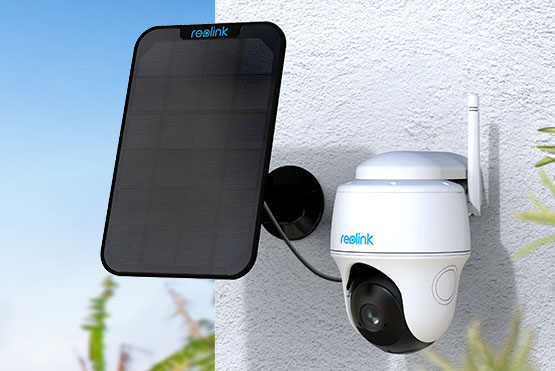Maintaining security around your property can be tricky when there isn’t power available at every corner. Luckily, there’s a whole breed of security cameras that can keep monitoring in those awkward corners thanks to integrated solar panels. Here are some of our favorite solar-powered security cameras.
Smart home security at a glance
- Best home smart locks
- Smart lighting for safety and security
- Best video doorbells
- Best options for outdoor lighting at home
Reolink Argus PT

The Reolink Argus PT camera is powered by a 6,500mAh battery and a 5V solar panel to provide full home protection. Motion-activated footage can be sent over 2.4 Ghz Wi-Fi and is stored locally on a 128GB microSD card.
The 105-degree wide camera is on a 355-degree pan and 140-degree swivel mount, so you have a flexible range of view. Combined with two-way audio and apps for Android, iOS, Windows, and Mac, you have a seriously smart home security option.
Ring Stick Up Cam Solar

Ring earned its name from its hugely popular doorbell but has since expanded into other types of home security. This solar-powered model ties in with their established ecosystem, complete with Alexa integration.
Ring’s $3/month subscription plan provides full access to the last 60 days of footage. This option is a great choice for folks who don’t want to miss a second of what’s going on around their home.
Zumimall Wireless Outdoor Security Camera

The Zumimall is a weatherproof outdoor security camera with two-way audio and a 120-degree field of view. Infrared night vision out to 66 feet and 1080p capture resolution help you catch all the details you need.
The whole family can check in on the camera thanks to the mobile app with support for multiple accounts. Besides mobile streaming, you can also store footage on a local SD card or through a cloud storage account.
Maxsa Solar Camera and Floodlight

The Maxsa Solar Camera stands out thanks to its significant floodlight attachment. This 16-LED, 878-lumen light can provide visibility out to 15 feet at night.
This security camera stores all motion-activated footage locally, so you can comfortably install it far from your home’s Wi-Fi network. Its IP44 rating ensures that it will keep working out in the wild.
Soliom S600 Security Camera

The Soliom S600 boasts a motorized 1080p camera that can spin 320 degrees and tilt 90 degrees. Combined with a quad-LED spotlight infrared night vision, you should be all set for capturing the footage you need.
The solar panel feeds into a 9,000mAh battery, while the footage itself goes either to the onboard microSD memory card or up to the cloud via Solion’s subscription service.
Solar security camera research and buying tips
Is there such thing as a solar camera?
Indeed, there is such a thing as solar cameras. They have local batteries that are charged by attached solar panels. Local storage and Wi-Fi connectivity give these cameras the ability to offload whatever footage they shoot.
Are solar-powered security cameras any good?
Solar-powered security cameras are quite good, offering high-definition footage, night vision, wide angles of view, and two-way audio. The real icing on the cake is being able to install the camera anywhere around the home without having to worry about running a power supply up to it.
Do solar cameras need Wi-Fi?
Most solar security cameras are built for simplicity of installation rather than fully off-grid setups. You’ll find many that do support storing footage locally, but then you’re stuck needing to offload that footage somehow. Wi-Fi connectivity remains the most reliable means of getting your footage and has the added bonus of live-streaming and mobile alerts.
How much does a solar camera cost?
Solar security cameras are quite affordable. Many of the models we’ve seen are under $100 each, while higher-end models get into the $200 territory.
What accessories are available for solar smart cameras?
Additional solar panels are generally a good investment, as a single panel’s efficacy will wane through the day. Being able to capture solar power from another angle offers peace of mind when it comes to keeping the camera up and running. Additional mounting options are often necessary, depending on the material you’re using and location. The need for a cloud storage solution will vary by brand, so check if there are local storage options before you find yourself on the hook for an additional monthly fee.
Hopefully, that answers all of your questions about solar smart home cameras. Being able to mount them independent of power availability opens up lots of options and guarantees your ability to keep a close eye on all corners of your property in the event of a loss of power.



